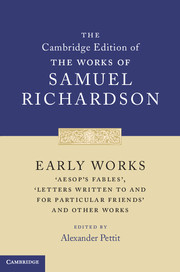Book contents
- Frontmatter
- Dedication
- Contents
- General Editors’ Preface
- Acknowledgements
- Chronology
- List of Abbreviations
- General Introduction
- Textual Introduction
- The Apprentice’s Vade Mecum (1733)
- A Seasonable Examination of the Pleas and Pretensions (1735)
- Preface to Aubin, A Collection of Entertaining Histories and Novels (1739)
- Aesop’s Fables (1739)
- Letters Written to and for Particular Friends (1741)
- Six Original Letters Upon Duelling (1765)
- Appendix: The Infidel Convicted (1731)
- Postscript
- Emendations
- Word-division
- Bibliographical Descriptions of Early Editions
- Explanatory Notes
- Index
Letter XXI
Published online by Cambridge University Press: 30 June 2022
- Frontmatter
- Dedication
- Contents
- General Editors’ Preface
- Acknowledgements
- Chronology
- List of Abbreviations
- General Introduction
- Textual Introduction
- The Apprentice’s Vade Mecum (1733)
- A Seasonable Examination of the Pleas and Pretensions (1735)
- Preface to Aubin, A Collection of Entertaining Histories and Novels (1739)
- Aesop’s Fables (1739)
- Letters Written to and for Particular Friends (1741)
- Six Original Letters Upon Duelling (1765)
- Appendix: The Infidel Convicted (1731)
- Postscript
- Emendations
- Word-division
- Bibliographical Descriptions of Early Editions
- Explanatory Notes
- Index
Summary
From the young Gentleman to his Mistress on her Arrival at her Father’s.
Dear Madam, May 25.
I have understood with great Pleasure your safe Arrival at your Father's House; of which I take the Liberty to congratulate your good Parents, as well as your dear Self. I will not, Madam, fill this Letter with the Regret I had to part with you, because I have no Reason nor Merit, at present, to expect that you should be concerned for me on this Score. Yet, Madam, I am not without Hope, from the Sincerity of my Affection for you, and the Honesty of my Intentions, to deserve in time, those Regards which I cannot at present flatter myself with. As your good Father, in his kind Letter to me, assured me, that he should consult your Inclinations, and determine by them, and by what should offer most for your Good; how happy should I be, if I could find my humble Suit not quite indifferent to your dear Self, and not rejected by Him! If what I have already opened to him as to my Circumstances, be not unacceptable, I should humbly hope for Leave to pay you and him a Visit at Nottingham; or if this be too great a Favour, till he has made further Enquiry, that he would be pleased to give himself that Trouble, and put it in my Power, as soon as possible, to convince him of the Truth of my Allegations, upon which I desire to stand or fall in my Hopes of your Favour and his. For I think, far different from many in the World, that a Deception in an Affair of this weighty Nature, should be less forgiven than in any other. Since then, dearest Madam, I build my Hopes more on the Truth of my Affection for you, and the Honour of my Intentions, than any other Merit, or Pretensions, I hope you will condescend, if not to become an Advocate for me, which would be too great a Presumption to expect, yet to let your good Parents know, that you have no Aversion to the Person or Address of, dearest Madam,
Your for ever-obliged, and affectionate humble Servant.
- Type
- Chapter
- Information
- Early Works'Aesop's Fables', 'Letters Written to and for Particular Friends' and Other Works, pp. 357 - 358Publisher: Cambridge University PressPrint publication year: 2011

